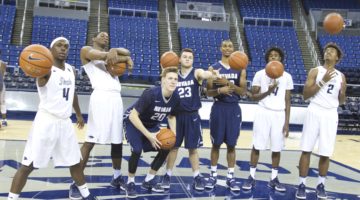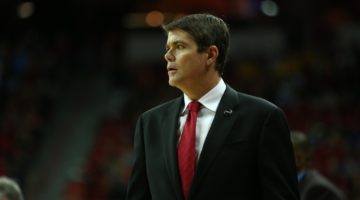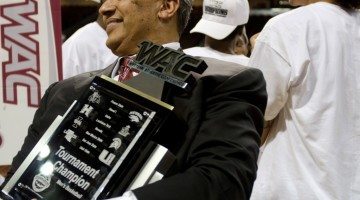by Jack Rieger
On Dec. 10, UNLV announced it was parting ways with head basketball coach Dave Rice just 16 games into the season. Rice had coached UNLV since 2011.
At the time of the firing, the Rebels had a 9-7 overall record and started conference play with three straight losses to Fresno State, Colorado State and Wyoming. Rice owned a 98-54 overall record during his time as coach, including an underwhelming 37-32 conference record. UNLV’s win totals decreased each year beginning in Rice’s first season, as a series of last-minute losses this year proved to be the coach’s final straw. UNLV athletic director Tina Kunzer-Murphy explained her reasoning for firing Rice midseason in a press conference following the announcement.
“I think any of you who have watched our games lately, you look at it and it’s been tough to watch,” Kunzer-Murphy said. “I think with all the talent that we have this year, everybody’s wondering how can we get this ship turned around. That’s when you make decisions to try to get it turned around.”
UNLV firing Dave Rice was not surprising if you’ve kept up with Vegas media; he wasn’t able to win a tournament game in four seasons, his teams never finished better than third in the Mountain West Conference despite hosting the conference tournament every year and Rice failed to coach effectively at the end of games.
Here’s what IS surprising: UNLV fired Rice in the middle of the season, which is incredibly rare in college basketball. The only time coaches are typically fired midseason is when NCAA violations are brought forth or something illegal surfaces.
Firing a coach midseason is rare mostly because it’s counterproductive. First, it’s unfair to recruits who committed to play for the head coach who recruited them. Secondly, it makes the program look dysfunctional after granting coach Rice a two-year extension following the 2014 season. UNLV will now pay Rice around a total of $1 million, receiving the remainder of his base salary ($300,000 per year) for this season and the remaining three years on his contract. Lastly, and most importantly, UNLV is going to struggle to convince new recruits to come to UNLV after firing its coach in the middle of the season. Chaos generally doesn’t attract elite talent.
The reason Dave Rice was fired midseason is because UNLV’s fans, boosters and athletic department have unrealistic expectations for their basketball team, which hasn’t won the Mountain West Conference or even a tournament game since 2008, yet the team is expected to finish in the top 25 and make the tournament on an annual basis. UNLV’s expectations stem from three primary sources:
1975-1991
During this 16-season stretch, UNLV made the tournament 12 times, including four final-four appearances and a national championship in 1990. Unfortunately someone forgot to remind Vegas this was 25 years ago and Jerry Tarkanian isn’t walking through the door to restore the program. UNLV’s primary viewing audience is 40- to 65-year-old die-hard fans who fell in love with the national championship Rebels and expect the modern team to return to that form.
Dave Rice’s ability to recruit
Many people criticized Rice’s ability to coach, but no one questioned his capability to recruit elite high school players from around the country. Rice recruited 11 Rivals.com 150 prospects since 2012, including future NBA first-round picks Rashad Vaughn and Anthony Bennett. Since 2012, Rice recruited four different classes ranking in the top 16 in the country, so fans went into every season with high hopes for the Rebels who never lived up to the potential of their recruiting.
Cliff Findlay
Several publications have suggested that UNLV’s largest donor, Cliff Findlay, along with other prominent donors threatened to pull funding if UNLV didn’t fire Rice. Kunzer-Murphy denied that allegation of course, but there is no questioning UNLV’s dependence on Findlay’s wallet considering the athletic department doesn’t have a lucrative budget like UCLA or Arizona. When your mom threatens to stop sending gas money, you cooperate, and UNLV certainly cooperated with its donors by firing Rice in the middle of the season.
According to a report from the Las Vegas Review-Journal, which cited an unnamed source, highly touted Louisville coach Rick Pitino would consider the UNLV job. The report also said Pitino had “several influential friends” in Las Vegas willing to spend big for the coach to come to UNLV.
I have a theory about this.
For the most part, when information is “leaked” through the media it’s because the party involved wants it leaked. I think UNLV boosters want the public, and specifically UNLV fans and administrators, to think they have a legitimate chance at Rick Pitino. For one, it keeps UNLV fans hopeful and optimistic about their future after mercilessly firing their well-mannered coach midseason who happened to play on UNLV’s national championship team in 1990. Secondly, it reminds UNLV fans and administration that any hope of landing a prestigious coach like Pitino relies on their donors, and you better not do anything to piss them off.
I’m not writing this column as a reporter of a rival school who is delighted with the dysfunction of an in-state opponent; I’m writing as a former UNLV fan who grew up in Las Vegas immersed in Rebel basketball six months of the year. And there is no question about it — Vegas is a basketball town desperate for its college team to be relevant again. But UNLV’s desperation combined with unrealistic expectations and a dysfunctional program have created a delusional fan base constantly finding itself in a familiar position: disappointed.
Jack Rieger can be reached at jrieger@sagebrush.unr.edu and on Twitter @JackRieger.













